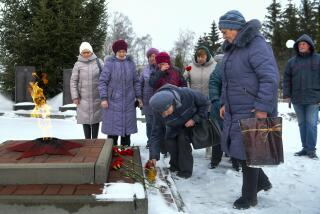Russia Acts to Help Solve Fates of MIAs, POWs
- Share via
MOSCOW — Two U.S. senators on a fact-finding mission here said Monday that they have found information that could explain what happened to several hundred American prisoners of war and servicemen missing in action from World War II and the Vietnam and Korean wars.
“We have been given assistance that could help us conceivably solve the fates of hundreds of Americans,” Sen. John Kerry (D-Mass.) told reporters.
But he added that he and his colleagues have not uncovered any information about POWs or MIAs who are still alive.
Asked if American MIAs or POWs from the three wars spent time in the former Soviet Union, Sen. Robert C. Smith (R-N.H.) said: “I think there are some indications of that.”
The Russian government told the senators that American deserters, contacted in Japan, had passed through the Soviet Union during the Vietnam War. The KGB security agency tried unsuccessfully to recruit them as agents. But the Russians insisted that none of them are still in the country.
“We have been told that we will be given those names,” Kerry said. “I think you get a sense of the kind of candor we’re talking about.”
Kerry and Smith told a news conference at the end of a four-day trip to Moscow that Russian officials had been very cooperative in supplying information about American MIAs and POWs from the three wars. Most of the cases they learned about were from the Korean War, Kerry said. But much more information is expected on POWs from Vietnam and World War II, as Russian and American researchers comb the archives during the next several months.
“We have 2,273 names from the Vietnam War and thousands more from Korea and World War II,” Kerry said after the news conference. “Our goal by the end of this is to resolve the vast majority of these cases. I believe we will do this.”
This unprecedented access to information from the files of the KGB and the former Soviet military, as well as meetings with military personnel who have given firsthand accounts of American POWs and MIAs, is a direct result of the openness of the administration of Russian President Boris N. Yeltsin. “We have no reason to believe they weren’t forthcoming,” Smith said. “We’re talking about dealing with the Yeltsin regime--and it’s a totally different ballgame.”
The Russian officials have agreed to allow American specialists to help them search the archives, and legislators from both countries plan to hold a conference in the fall on the fate of MIAs and POWs. “We want to take advantage of the window,” Kerry said. “You don’t know how long it will be open.”
Russian officials also promised that, prior to trips to Laos and Vietnam planned by the senators, they will send an envoy to persuade these governments to follow the Russian example and break years of secrecy, Smith said.
Although the senators learned through interviews and documents about hundreds of specific cases, they refused to give any names until the stories are checked in the United States. They were told, for instance, that an American pilot flying over Vietnam was shot down by a Soviet-operated surface-to-air missile. The Soviet army was not supposed to be in Vietnam, so the pilot was slain. The son of a Soviet serviceman who witnessed the killing told the senators that he knows the location of the American’s dog tags and helmet. “This is a case resolved for one American family,” Kerry said.
Smith defended the trip, prompted by retired KGB Gen. Oleg Kalugin’s disclosure last month before a U.S. congressional panel that Soviet KGB officials interrogated American soldiers in Vietnam as late as 1978. Vietnam has repeatedly claimed that the last American POW was returned in 1973. “This is not a wild-goose chase” to the families who learn what happened to their loved ones, Smith said.
The new willingness on the part of Moscow officials to disclose information about American POWs could answer decades-old mysteries. For example, KGB officials promised to look into allegations that American POWs from all three wars have ended up in Soviet prison camps.
Vladimir P. Lukin, the new Russian ambassador to the United States, told the news conference that he could not see anything to prevent America from getting access to any archives on American citizens, including files on a South Korean airliner shot down when it strayed into Soviet airspace in 1983, killing 269 passengers and crew. “I do not see anything that prevents us from opening this,” Lukin said. “There is nothing that prevents us from opening the whole truth.”
More to Read
Sign up for Essential California
The most important California stories and recommendations in your inbox every morning.
You may occasionally receive promotional content from the Los Angeles Times.











